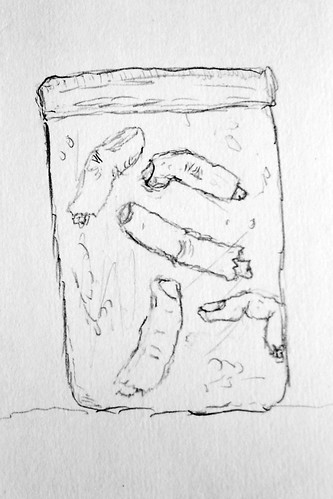Anthony Powell, who was a bit too young to have known Firbank--whom he described as a "talented, painfully shy, lonely, tipsy, ailing homosexual" in a review--was a fan, and Firbank's influence, like Hemingway's, can be seen in the clipped dialogue of Powell's early novels. Michael Dirda, whose enthusiasms have been drawing me, from one to the next, all week, has described Firbank's spare style nicely:
He discarded leisurely descriptions, stripped dialogue of its "he saids" and "she saids," subordinated plot to language, and made his characters, those absurd and ingratiating puppets with names like Mrs. Shamefoot and Madame Wetme, into vehicles for social satire and joyful, imaginative extravagance.Dirda quotes Firbank--echoing Scott Fitzgerald's stated willingness to scrap a whole story for the sake of one good sentence he could use elsewhere--saying, "I think nothing of filing fifty pages down to make a brief, crisp paragraph or even a row of dots."
Nicolson's depiction of Firbank, as the title character of the story "Lambert Orme," is so good that it's easy to understand why it's lasted:
It would be impossible, I think, to actually be as decadent as Lambert looked. I split the infinitive deliberately, being in the first place no non-split die-hard (oh, the admirable Mr. Fowler!), and desiring secondly to emphasise what was in fact the dominant and immediate consideration which Lambert evoked. I have met many men with wobbly walks, but I have never met a walk more wobbly than that of Lambert Orme. It was more than sinuous, it did more than undulate: it rippled. At each step a wave was started which passed upwards through his body, convexing his buttocks, concaving the small of his back, convexing again his slightly rounded shuolders, and working itself out in a backward swaying of the neck and head. This final movement passed off more rapidly than the initial undulations, with the resulting impression of a face upturned generally, but bowing at rhythmic intervals, as if a tired royalty or a camel marching heavily along the road to Isfahan. . . . He dressed simply, wearing an opal pin, and a velours hat tilted angularly. He had a peculiar way of speaking: his sentences came in little splashing pounces; and then from time to time he would hang on to a word as if to steady himself: he would say “Simplytooshattering FOR words,” the phrase being a slither with a wild clutch at the banister of “for.”Firbank's works are available here in the States from New Directions, but back in the early 1930s it was Powell himself, while he was working at Duckworth, who was responsible for getting them back into print in England. In Messengers of Day, the second volume of his autobiography, he wrote,
I also pressed the claims of Ronald Firbank, whose novels at this period were all out of print. The directors showed no overwhelming enthusiasm for Firbank, but, in consequence of making enquiries as to where the "rights" lay, it was disclosed that Firbank had left a sum of £800 to be devoted to guaranteeing the republication of his books at some future date.There's a lesson here, authors: attend to your wills!
I've only barely read Firbank: I gave him a half-hearted try several years ago and wasn't quite convinced. But Powell's enthusiasm, Nicolson's amusement, and Dirda's claim that, "In the right mood they are very nearly the most amusing novels in the world," have convinced me to try again.

